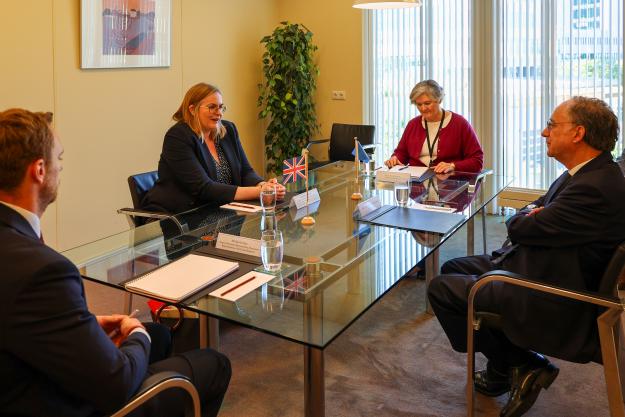
Ms Rebecca Sagar OBE, Head of the Counter Proliferation and Arms Control Centre of the UK’s Foreign, Commonwealth, and Development Office (FCDO), and Ambassador Fernando Arias, Director-General of the Organisation for the Prohibition of Chemical Weapons (OPCW), with their delegations
THE HAGUE, Netherlands—24 June 2024—The Director-General of the Organisation for the Prohibition of Chemical Weapons (OPCW), Ambassador Fernando Arias, met with the Head of the Counter Proliferation and Arms Control Centre of the UK’s Foreign, Commonwealth, and Development Office (FCDO), Ms Rebecca Sagar OBE, at OPCW Headquarters in The Hague.
In the meeting, the Director-General and Ms Sagar discussed the status of the implementation of the Chemical Weapons Convention (CWC) in relation to the global security environment. While briefing the senior British official on contemporary scientific and technological challenges to the Convention, the Director-General emphasised the significant role of the OPCW’s Centre for Chemistry and Technology in bolstering the OPCW’s capacity to counter emerging threats and prevent the re-emergence of chemical weapons. He also underscored the OPCW’s ongoing efforts to leverage the potential of Artificial Intelligence as well as mitigate the risks posed by the technological advancement.
Ms Sagar remarked: “Today’s international security environment and the continued threat of chemical weapons use by state and non-state actors underline the vital role of the OPCW in safeguarding global security. As a cornerstone of the international disarmament system, the OPCW has the United Kingdom’s full and enduring support.”
The Director-General expressed his appreciation by stating: “The United Kingdom is a key partner for the OPCW and a staunch supporter of the Convention. I thank and congratulate the UK’s strong commitment to the mission of the OPCW.”
Background
The United Kingdom of Great Britain and Northern Ireland has been an active member of the OPCW since the Chemical Weapons Convention entered into force in 1997. The UK is a member of the Executive Council, the OPCW’s executive organ, which is tasked with promoting the effective implementation of and compliance with the Chemical Weapons Convention as well as supervising the activities of the Organisation’s Technical Secretariat.
To date, the UK has made voluntary contributions totalling EUR 10,905,753 to 18 OPCW trust funds, including the Trust Fund for a Centre for Chemistry and Technology, and the Trust Fund for Syria Missions.
As the implementing body for the Chemical Weapons Convention, the OPCW, with its 193 Member States, oversees the global endeavour to permanently eliminate chemical weapons. Since the Convention’s entry into force in 1997, it is the most successful disarmament treaty eliminating an entire class of weapons of mass destruction.
On 7 July 2023, the OPCW verified that all chemical weapons stockpiles declared by the 193 States Parties to the Chemical Weapons Convention since 1997 — totalling 72,304 metric tonnes of chemical agents — have been irreversibly destroyed under the OPCW’s strict verification regime.
For its extensive efforts in eliminating chemical weapons, the OPCW received the 2013 Nobel Peace Prize.
